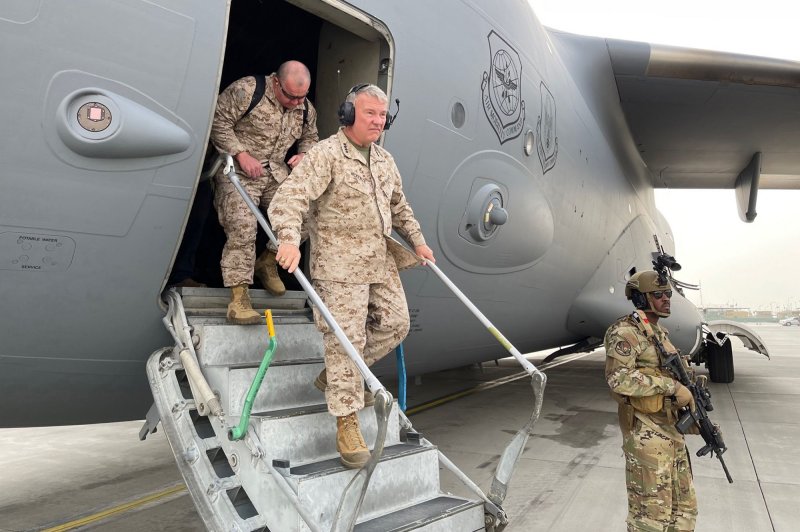1 of 4 | U.S. Marine Corps Gen. Frank McKenzie (C), the commander of the U.S. Central Command, said a U.S. drone strike mistakenly targeted an aid worker, killing 10 civilians, including seven children. Photo by Capt. William Urban/U.S. Navy |
License Photo
Sept. 17 (UPI) -- The Pentagon on Friday admitted it killed 10 Afghan civilians, including several children, in a drone strike in Kabul meant to target Islamic State-Khorasan Province militants last month.
Gen. Frank McKenzie of the U.S. Central Command said the military, in a "tragic mistake," believed a civilian vehicle was associated with the militant group behind an explosion at the Hamid Karzai International Airport in Kabul that killed dozens of civilians and 13 U.S. troops Aug. 26.
ISIS-K, an offshoot of the Islamic State active in the historic Khorasan region, claimed responsibility for the attack, drawing promises of retaliation from U.S. President Joe Biden.
"This strike was taken in the earnest belief that it would prevent an imminent threat to our forces in the evacuees at the airport, but it was a mistake, and I offer my sincere apology," McKenzie said. "As the combatant commander, I am fully responsible for the strike and this tragic outcome."
The U.S. military carried out the airstrike Aug. 29 and initially reported it killed at least one ISIS-K militant and eliminated a threat on the airport, which the Taliban renamed Kabul International Airport after taking over the capital.
The Pentagon believed the driver of the vehicle, Zemari Ahmadi, was involved with ISIS-K and had explosives in his vehicle. Defense Secretary Lloyd Austin III said, though, that Ahmadi was not linked to the terror group and instead worked for Nutrition and Education International, an aid group.
Austin offered his condolences to the victims' families and said he hopes the Defense Department will "learn from this horrible mistake."
"We now know that there was no connection between Mr. Ahmadi and ISIS-Khorasan, that his activities on that day were completely harmless and not at all related to the imminent threat we believed we faced, and that Mr. Ahmadi was just as innocent a victim as were the others tragically killed," he said.
Austin added that he's ordered a review of the investigation into the airstrike to ensure that appropriate accountability measures are taken.
The U.S. military launched a series of retaliatory attacks on ISIS-K targets in the days after the Aug. 26 attack on the airport. The violence came amid the United States' effort to evacuate citizens and Afghan civilians who had helped the U.S. military.
The Taliban quickly took control over Afghanistan during the United States' troop withdrawal from the country, sparking the mass evacuations, which concluded Aug. 31.
Secretary of Defense Lloyd J. Austin III (L) and Chairman of the Joint Chiefs of Staff Army Gen. Mark A. Milley deliver remarks about the end of the 20-year military mission in Afghanistan at the Pentagon, in Arlington, Va., on September 1. Photo by Ken Cedeno/UPI |
License Photo
















